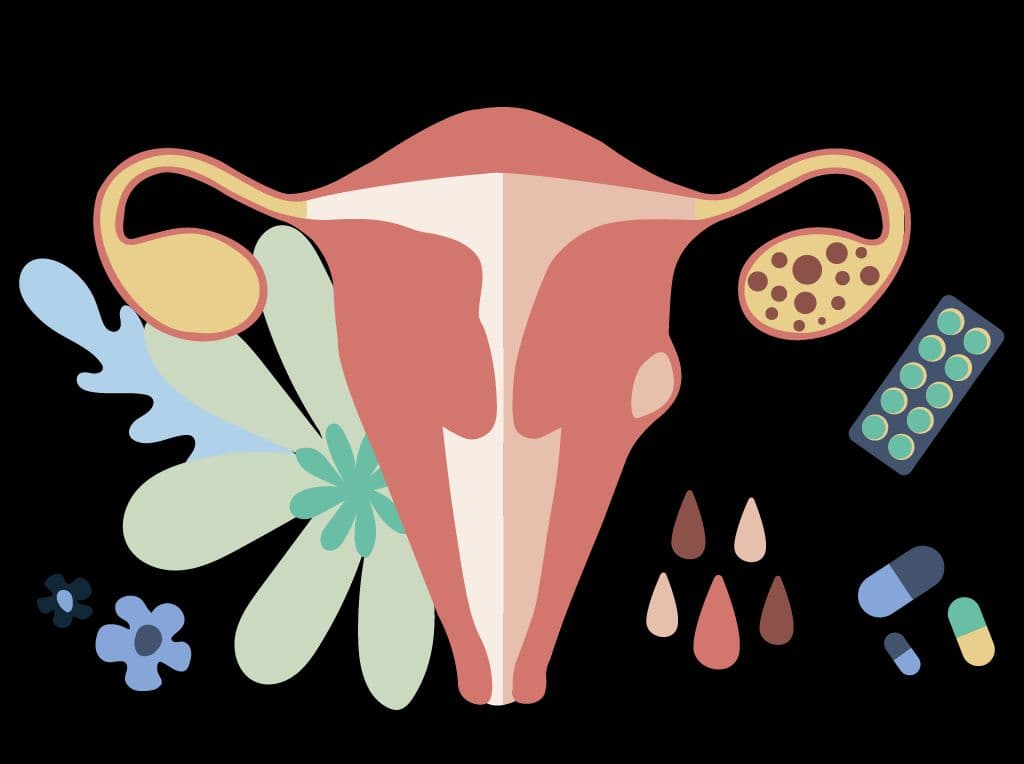Polycystic ovary syndrome (PCOS) is a hormonal disorder predominantly occurring in women of reproductive age. Ladies with PCOS may have inconsistent, delayed or lengthy periods or an abundance of male hormone (androgen) levels. The ovaries can develop small follicles and there can be irregularities in ovulation. The specific reason for PCOS is not clear. Early diagnosis and treatment alongside weight reduction may diminish the danger of long-term difficulties, for example, type 2 diabetes and heart disease. Read on to find out the causes, long-term risks and lifestyle changes that one needs to make if diagnosed with PCOS.
Why does PCOS happen?
PCOS doesn’t happen due to a single cause. It’s a multifactorial condition. Different factors in your environment and your body together act and contribute to the development of PCOS.
- Genetics – Genetics play a significant role in the development of PCOS. Altogether, 20 to 40 percent of females have first degree relatives with PCOS.
- Insulin Resistance – Insulin resistance means that your cells can’t use insulin properly. The primary role of insulin is to help the body use sugar from foods for energy. When cells can't utilize insulin appropriately, the body's need for insulin rises. The pancreas makes more insulin to counterbalance the perceived lack of insulin. The additional insulin triggers the ovaries to make more male hormones.
- Increased Androgens -Increase in the levels of insulin leads to an increase in androgen production in the body. Those elevated levels of androgens are responsible for cosmetic concerns such as acne, excess hair growth over the face or chin, also known as hirsutism. Androgens in excess can also cause mood changes, depression, and male pattern hair loss. This excess androgen also prevents ovulation. Irregularities in ovulation are responsible for irregular periods and difficulty in conceiving children.
Long-term risks for PCOS
A long list of long-term risks accompanies (polycystic ovarian syndrome) PCOS. While they may seem intimidating to a new reader, you need to understand that your lifestyle choices play a crucial role in determining your risk for all the conditions listed below, as does your family history.
- Diabetes -One of the comorbidities is diabetes. More than half of the women with PCOS will have diabetes or pre-diabetes which is glucose intolerance before the age of 40 years.
- Gestational Diabetes - If you’re a PCOS patient that gets pregnant your risk for having poor glucose control during pregnancy is very high.
- High blood pressure - High blood pressure by itself doesn’t cause PCOS. PCOS by itself doesn’t cause high blood pressure. It’s just a risk factor. PCOS increases your risk of having high blood pressure especially if you have a strong family history or if your BMI is on the higher side.
- Lipid Imbalances - Women with PCOS will have higher levels of bad cholesterol and lower levels of good cholesterol. When the bad cholesterol is high or your total cholesterol is high the risk for heart disease and stroke goes up.
- Sleep Apnea - Women who have a lot of neck fat, or are obese may also have the risk of developing sleep apnea. Sleep apnea is a severe sleep disorder that happens when an individual's breathing is interrupted while sleeping. Sleep apnea by itself also raises your risk for diabetes or heart disease.
- Mental Health Concerns - Women struggle with exaggerated PMS symptoms, PMDD, depression and anxiety due to the stress and imbalance of hormones that come with PCOS.
- Endometrial cancer - If your body has been struggling with hormonal imbalance for a very long time and if your estrogen levels are very high, the inner lining of your uterus or endometrium can build up. This can lead to some premalignant changes causing problems related to obesity, ovulation, insulin resistance and diabetes. They increase your chances of developing cancer of the endometrium.

PCOS and Skincare
Here are a few steps that can take to care of your skin if you have been diagnosed with PCOS:
- One needs to find makeup products that suit their skin.
- You need to make sure that you’re using a good sunscreen and a good moisturiser. It is preferable to use gel-based moisturiser and sunscreens if you have very oily skin.
- Also, have a cleansing routine. If needed, cleanse your skin twice and always clean it in the morning.
Lifestyle Changes in PCOS
As stated above (PCOS) increases insulin levels which leads to an increase in androgen production. This further leads to acne and irregular periods, and it can also cause weight gain. Since the male hormone triggers this weight gain, it typically happens around the abdomen. Women with PCOS generally have an apple-shaped body as opposed to a pear-shaped body.
- For most women, diet can go a long way in reducing the weight gain caused by PCOS. Increase the fibre in your diet.
- Reducing refined carbohydrate intake really helps. Try picking foods with low to medium GI’s. The Glycaemic index is the capacity of the food to raise your blood sugar. You want to eat types of food that keeps your blood sugar levels stable over a period of time instead of erratically fluctuating it.
- Aim for at least 150 minutes of moderate-intensity exercise.
- Good sleep and stress management techniques can also go a long way in managing weight gain during PCOS.
Above all, don’t hesitate to reach out for help!
PCOS is undoubtedly a hard pill to swallow. The irregular hormones, the anxiety of skin changes, weight gain, and hormonal imbalances can all be challenging to deal with. However there are many healthcare providers from various specialities that go a long way in helping you in this journey. Seek a therapist if the anxiety or depression is too hard to handle right now, a nutritionist if you feel lost about your diet or a gynaecologist who does not dismiss your concerns.
Disclaimer - This information is educational and should not be construed as medical advice. Please consult your doctor before making any dietary changes or adding supplements
ProactiveForHer is a digital clinic for women, offering accessible, personalised, and confidential healthcare solutions. We offer out-patient care, diagnostic services and programs for various health concerns of Indian women, across their lifetime - from puberty to pregnancy to menopause. To know more on the sexual and reproductive health of women, visit https://www.proactiveforher.com/

